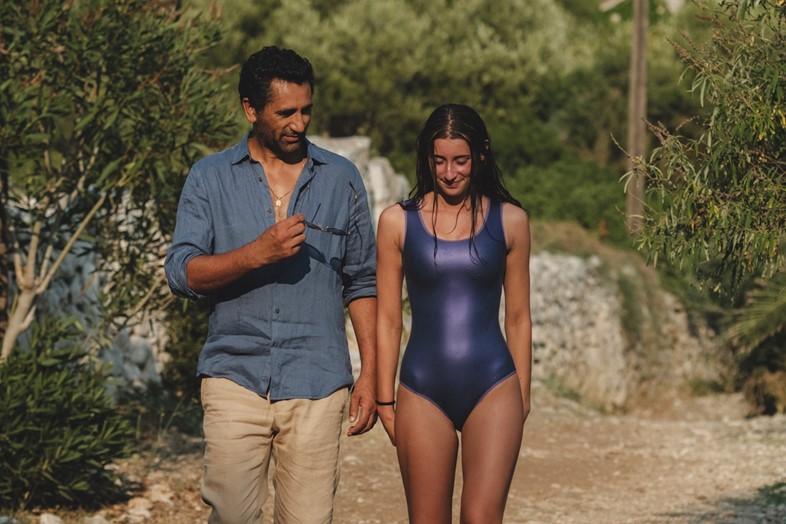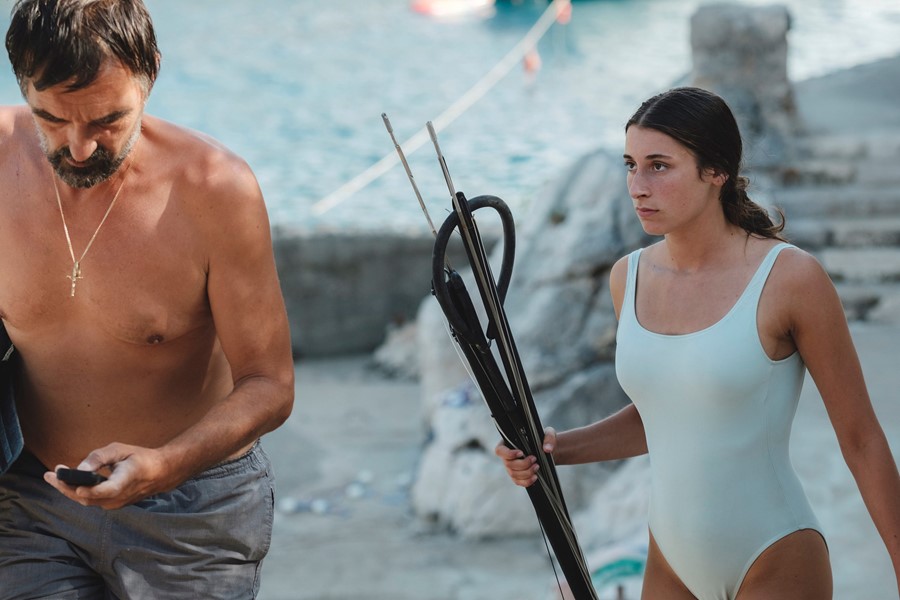As her new film Murina is released, Gracija Filipović talks about the pitfalls of the tourism industry in Croatia, and getting into character as the scuba-diving, harpoon-wielding Julija
Growing up in Dubrovnik, Croatia, Gracija Filipović was regularly called upon to explain that the so-called “pearl of the Adriatic”, whose city walls have stood for 700 years, was not a set built for television. “People would legit start asking me if the whole of the old town was built for Game of Thrones,” says Filipović, miming a facepalm over a Zoom link from Zagreb. “I don’t know if you should put this in your interview, I don’t want to offend anyone!” But the hapless American holidaymakers she describes – for, reader, they were American – tell a wider story about a country in danger of selling its soul to tourism.
“Nowadays I feel like everybody just wants to sell their land so they can build these apartments for tourists,” says the Croatian star of Murina, a shimmering and sensuous coming-of-age film with big themes. The film won the Caméra d’Or at last year’s Cannes Film Festival for its director, Antoneta Alamat Kusijanović – a first-feature award previously bestowed on the likes of Jim Jarmusch, Steve McQueen and Miranda July. “I think that people forgot to worship what they got from their parents, their grandparents, the land that we inherited. Now it’s just about the money. And the quicker we get the money the better.”
Murina locks her character, Julija, in a battle of wills with her abusive dad, Ante (Leon Lučev), a spearfisherman who is trying to sell the family plot. They live on a secluded isle whose beauty has drawn the attention of Javier, a developer scouting locations for a luxury tourist resort. Javier is a friend of the family, but old resentments start to simmer when he strikes up a bond with Julija, whose dreams of escape he encourages. Is he the caring figure he seems? Or a wily capitalist who surveys these people with the same entitled air he reserves for their land?

“[Javier is] ambiguous, definitely,” says Filipović. “I sometimes feel like he’s just there to show himself, as the best and most powerful man. But then when he actually has to do something, he panics and he’s not brave at all. He’s actually a coward. But I think the best gift that Javier could ever give Julija is just to give her strength to free herself, and not for him to free her. She just needs someone to tell her ‘you can do this.’”
Filipović, a former professional swimmer who learned how to scuba-dive and wield a harpoon during the shoot, plays Julija with a coolly watchful air, seeing through her father and enabling her mother’s insecurities even as she struggles to see through Javier. It’s a brilliant, layered performance that shows the character’s vulnerability (Filipović was 17 years old when the film was shot) and her strength in confronting her dad. “I mean, you have to be brave to say no to a man like this,” says Filipović. “[Especially] with the isolation of the island – like, he can lock her inside the house and nobody would know.”
As the father-daughter conflict escalates and Julija’s thoughts turn to murder, so too does a kind of romantic rivalry with her mum, who sees in Javier her own frustrated dreams of a different life. “She is jealous, because she realises her daughter will do something she was never able to do,” says Filipović. “And in that moment, she realises her daughter is much more mature and braver than she is. But I think that deep down, she’s really happy that her daughter will be able to do this.”
The performance was in some ways made possible by Into the Blue, another collaboration between Filipović and Kusijanović made when the former was just 13. In the prize-winning 2017 short film, she also plays a girl named Julija, who moves back to the coast with her mum to escape an abusive father. The parallels are striking, and allowed Filipović to live with this character – or some version of her – for close to five years. To consolidate their bond, the actress says she kept a diary to enable her to see things from Julija’s perspective. “The first thing I felt was her deep connection with nature, and the sea especially. When I started writing the diary, I felt more and more connected to her. I realised that we had the same kind of strength and will to change [things]. If something is not right, we will both say something.”
After shooting wrapped on Murina, Filipović returned to Dubrovnik. Then Covid hit, and the American tourists all disappeared. “At first everyone was panicking, because the whole city is built on tourism. But then at one point I feel like everybody was relieved, there weren’t so many tours, we could just enjoy our city. And for me this was the only good part about the pandemic. But I also think it’s made a lot of people realise how fragile this concept of working is [now].”
In the end, Julija’s determination to forge her own path mirrors the crossroads Croatia finds itself in post-Covid. Her refusal to be defined by others is a trait she shares with Filipović, who moved to Zagreb to study biology and genetics last year. “I don’t like when people put me in boxes. Does that make sense?” she says. “It’s like [some people think] because I went to biology school I must hate acting. I mean, no, it’s not like that; I just think that with hard work and discipline, you really can do anything. And I mean, if I can do both, why not?”
Murina is in selected cinemas from April 8.
